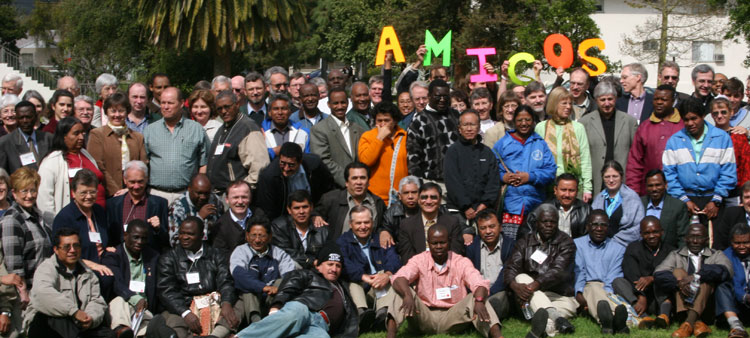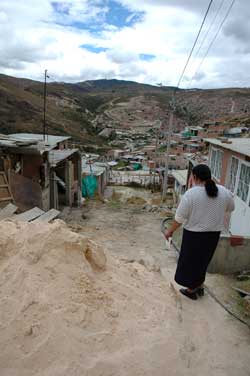 by Marla Pierson Lester
by Marla Pierson Lester
BOGOTÃ, Colombia – As a coordinator for a project documenting how a long-running armed conflict continues to impact Colombia’s Protestant churches, Mennonite Central Committee (MCC) worker Janna Hunter-Bowman spent hours poring through horrific details of deaths and threats and exploring how Christians are boldly living out their faith in the midst of pervasive violence.
Now, she hopes that Christians in the United States and Canada will take to heart the resulting human rights report and that it will move them to action.
“More than anything we hope readers of the report will allow themselves to be troubled and challenged by the testimonies provided and join the witness,” Hunter-Bowman said. “We hope readers will share the suffering and the hope wherever they have the opportunity to speak, from the local congregation to Congress.”
The resulting document, “A Prophetic Call: Colombian Protestant Churches Document Their Suffering and Their Hope,” is built from testimonies gathered by grassroots church members or leaders. The first report, released this fall, documents details of 29 assassinations of men, women and children linked to congregations, 84 cases of people forced to flee their homes, 21 civilian combat-related injuries, four arbitrary detentions and other human rights violations. It also chronicles how churches are living out their faith with hope and perseverance.
“Despite fear, Christians claim the gospel mandate of being good news and sow seeds of peace,” she said. “In the midst of the threats, forced displacements, forced recruitments, even where pastors’ children are being forcibly recruited, people are continuing to live out their faith. And they’re doing so in courageous and innovative ways.”
Hunter-Bowman and a coworker on the project, Pedro Acosta Fernandez, trained five regional coordinators and more than 30 church members to do interviews to document murders and threats. This can be risky work, and church members know they are taking a chance by getting involved in documenting violence, but they tell Hunter-Bowman it’s worth it. One pastor, she said, called it a “revelation from God.”
He told Hunter-Bowman, “We’re acquiring the skills to lift the veil of silence and injustice the whole population and church population in Colombia is living under. We have been silenced all of our lives. Now we’re acquiring skills to break the silence and you’re telling us people are going to listen.”
Hunter-Bowman wants to make sure that people in the United States and Canada do listen. She calls on U.S. and Canadian Christians to educate themselves about the suffering that churches are living under and to witness on their behalf.
Colombian Mennonites are asking that Christians in the United States and Canada speak out, she said, and they want to know why Christians in these countries don’t say more to their governments.
“We need you to listen to these voices above those that tell you military solutions will work and that governments know best. Listen to your brothers and sisters on the ground rather than governments that promote their interests over the interests of everyday people.”
Some 2,500 to 3,000 people a year are killed in the armed conflict in Colombia. More than 3.5 million have been forced to flee their home, including more than 2 million in the last six years. Church members are not immune, and pastors in rural areas began flooding Justapaz, a Colombian Mennonite peace and justice organization in Bogota, with horrific tales. Then-director Ricardo Esquivia compiled his notes into a report in 2003, which was still being quoted by human rights advocates as late as last summer.
Justapaz, which recently received an international nonviolence award from the Swedish Fellowship of Reconciliation, and Esquivia, who continues as director of the Commission for Restoration, Life and Peace of the Evangelical Council of Colombia (CEDECOL), collaborated in this project to provide updated documentation on the conflict’s impact on Protestant churches.
Hunter-Bowman, who works for Justapaz, noted that while official government statements say the security situation in Colombia is dramatically improving, “church people in the regions are living something different. Through this report, they are telling us this much,” she said.
Fernandez, who represents CEDECOL, noted that each case strikes him hard even though he grew up in the context of this conflict. “Each story carries its own power. I think a struggle all of us have that are involved in this work is how do you continue on … not being battered by these stories but not losing sensitivity to them,” he said. “We are surprised with each case. And that affirms our humanity.”
“When I read over these stories,” said a grassroots coordinator who did not want to be named, “the only thing that gives me rest is that these acts and crimes against humanity will not have the last word. We rest in the hope that the Scripture will be fulfilled — that justice and truth will one day reign.”
That hope and determination are gifts that Hunter-Bowman has found in Colombia.
Hopelessness, she said, is a luxury. “Here many people cannot afford to lose hope. It’s what sustains and empowers war victims and the destitute when all else has been taken from them. The invitation is to be a church body that embraces and responds to those members who have no choice but to struggle on. … We have to believe much can grow from a small brown seed.”
She acknowledges that in the United States, it is sometimes easy for people to feel as if they do not have power, as if their voice is small before the enormous structure of the U.S. government.
“Yet caring constituents who educate their elected officials based on stories change hearts and votes,” Hunter-Bowman says. “In Colombia, church leaders tell us that U.S. military assistance inflames the conflict, making their ministry more difficult and dangerous. You can help make sure your representatives in Congress understand that dynamic. Witness through sharing the personal costs and the hope that churches are experiencing.” (See below for specific suggestions on how Christians can respond to the conflict in Colombia.)
Report No. 1 was released in August and covers cases from January 2004 to July 2006. A follow-up report is scheduled to be released in late March.
Marla Pierson Lester is a writer for MCC.
Responding to the call of churches in Colombia
Pray for the victims, the perpetrators and the peacemakers in Colombia.
Read the report, “A Prophetic Call: Colombian Protestant Churches Document Their Suffering and Hope,” available at mcc.org/us/washington.
Share the stories of suffering and hope in your community and beyond.
Advocate. Speak to government officials on behalf of those brave souls who, despite the risk of death, continue to give life to seeds of peace.
Take part in the Days of Prayer and Action for peace in Colombia, May 20-21, an invitation from Colombian churches to their North American sisters and brothers.
For more information, contact Rebecca Bartel, policyanalyst.mcc@gmail.com, or Theo Sitther at the MCC Washington Office, (202) 544-6564, tsitther@mcc.org.

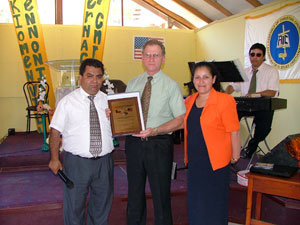 The Partner in Mission relationship between Perkiomenville Mennonite Church and The Tabernacle of Christ Church in Vina del Mar, Chile, continues to grow. What began with a divine encounter by the two pastors in New York City in 2002 has blossomed into an ongoing partnership of mutuality. Recent events have deepened this relationship.
The Partner in Mission relationship between Perkiomenville Mennonite Church and The Tabernacle of Christ Church in Vina del Mar, Chile, continues to grow. What began with a divine encounter by the two pastors in New York City in 2002 has blossomed into an ongoing partnership of mutuality. Recent events have deepened this relationship.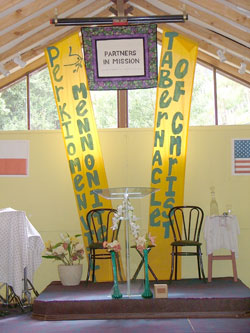 It benefits Perkiomenville by providing opportunity for persons from the US to observe both social and church life in another culture. We experience the passion of worship and confident faith of the brothers and sisters in Chile. Each time as new persons go with a mission team, the vision of God’s Kingdom is expanded. Our congregation is enriched by this relationship.
It benefits Perkiomenville by providing opportunity for persons from the US to observe both social and church life in another culture. We experience the passion of worship and confident faith of the brothers and sisters in Chile. Each time as new persons go with a mission team, the vision of God’s Kingdom is expanded. Our congregation is enriched by this relationship.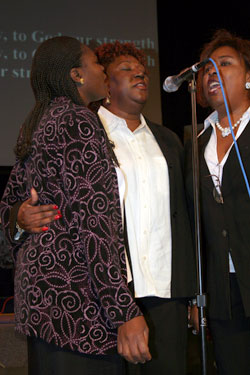 Mennonite World Conference has released the Mennonite, Brethren in Christ and Related Churches World Directory 2006. New numbers show membership in the 217 churches now listed in 75 countries around the world is just under 1.5 million (1,478,540). Africa, with 529,703 members, continues to have the largest and fastest growing membership among the five continental regions. The Meserete Kristos Church (MKC) in Ethiopia is the largest national conference globally, with 130,727 members. All continental regions except Europe have shown increased membership.
Mennonite World Conference has released the Mennonite, Brethren in Christ and Related Churches World Directory 2006. New numbers show membership in the 217 churches now listed in 75 countries around the world is just under 1.5 million (1,478,540). Africa, with 529,703 members, continues to have the largest and fastest growing membership among the five continental regions. The Meserete Kristos Church (MKC) in Ethiopia is the largest national conference globally, with 130,727 members. All continental regions except Europe have shown increased membership.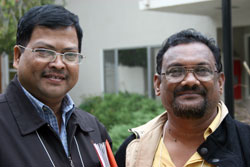 Second to Africa in the rate of growth among continental regions is the Caribbean, Central and South America (16.8 percent), with 155,531 members in 2006 compared to 133,150 in 2003. Close behind is Asia and the Pacific (15.9 percent) with 241,420 members in 2006, up from 208,155 in 2003. Numbers for North America, in fourth place in terms of growth, are noted above. Europe showed a slight decline of 1.9 percent with 52,222 members in 2006 compared to 53,272 in 2003.
Second to Africa in the rate of growth among continental regions is the Caribbean, Central and South America (16.8 percent), with 155,531 members in 2006 compared to 133,150 in 2003. Close behind is Asia and the Pacific (15.9 percent) with 241,420 members in 2006, up from 208,155 in 2003. Numbers for North America, in fourth place in terms of growth, are noted above. Europe showed a slight decline of 1.9 percent with 52,222 members in 2006 compared to 53,272 in 2003.